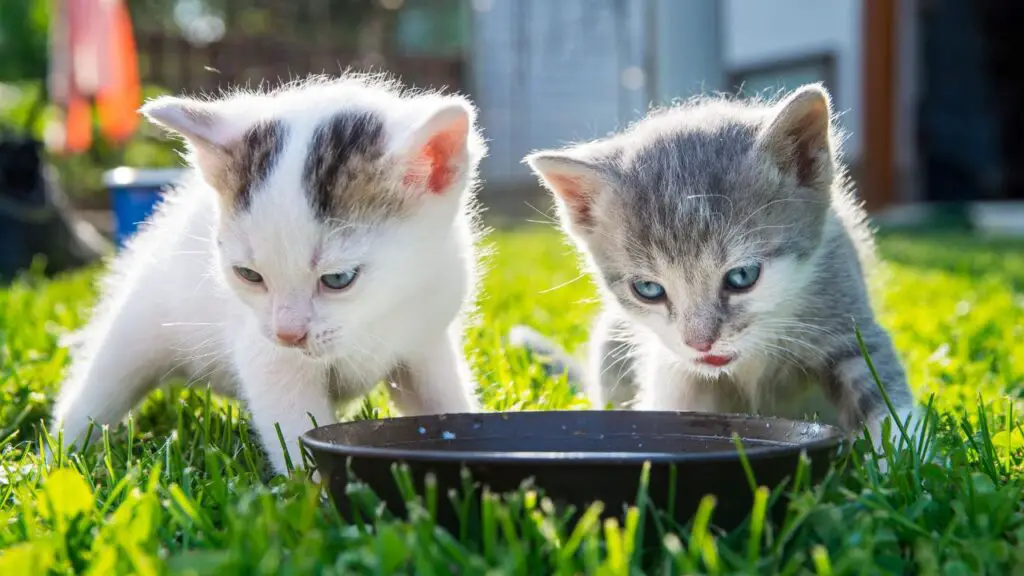Yes, Kittens can drink milk from other animals, but only if they are orphaned or cannot drink their mother’s milk for some reason.
In that case, they should be fed with kitten formula milk, which is specially designed to meet their nutritional needs and support their growth and development.
It is not advisable to use milk from cows or goats for kittens, as it may lead to digestive issues and a lack of the appropriate balance of nutrients.
Kittens can drink their mother’s milk until they are weaned, which usually happens around 8 to 12 weeks of age.
Once they reach a certain point, milk is no longer necessary for their diet as solid food and water provide all the necessary nutrients.
Is milk from other animals safe for cats?
Kittens may naturally want to drink milk. Yet, milk from other animals can lead to digestion problems and allergies in cats.
The lactose in milk is hard for cats to digest. This can cause vomiting, diarrhea, and stomach upset. Plus, many cats are lactose intolerant.
So, it’s best to not give milk from other animals to cats, including kittens. Instead, give them fresh water and a balanced diet.
Tip: Buy special, lactose-free cat milk from pet stores if you want to give kittens a treat.
What are the risks of drinking milk from other animals?
Milk is often thought to be nourishing and beneficial. However, drinking milk from other animals may have risks. Here are a few:
- Lactose Intolerance: Many people and animals don’t have the enzymes to digest lactose, which can cause discomfort.
- Contamination: Other animal milk may contain bacteria or other contaminants that can make you sick.
- Nutritional Imbalances: Different types of milk have different nutrients, which could cause imbalances if consumed consistently.
- Kittens should not be given milk from other animals. Cow milk or milk from other animals can cause digestive upset and diarrhea in kittens, who need specific nutrients for healthy growth.
What should you do if your cat drinks milk from other animals?
If your cat occasionally drinks milk from cows, goats, or sheep, there is no need for excessive concern as long as it is a small amount.
It is safe for cats to drink small portions of milk from various animals, including cows, goats, sheep, and others.
However, consuming more than a few tablespoons may lead to stomach problems, since most cats cannot digest the lactose sugar in milk properly.
This is because cats are typically lactose intolerant.
How can you provide your cat with a safe alternative to milk from other animals?
Kittens particularly benefit from milk as it gives them hydration and nutrients, especially when they’re weaning.
Safe alternatives for cats include:
- Goats’ milk – lower in lactose, it’s packed with vitamins and protein.
- Lactose-free milk – made of soy, almond, or oats, is easy on their digestion.
- Formula milk – a high-quality milk that replicates the mother’s milk, giving kittens the right balance of nutrients for growth.
Are there any benefits to feeding kittens milk from other animals?
There are no significant benefits to feeding kittens milk from other animals, and there are some potential risks.
The only milk that kittens need is their mother’s milk, which provides them with all the essential nutrients and antibodies they need to grow and thrive.
If kittens are orphaned or cannot drink their mother’s milk for some reason, they should be fed with kitten formula milk, which is specially designed to meet their nutritional needs and support their growth and development.
Can kittens drink goat’s milk instead of cow’s milk?
Yes, they can drink Goat’s milk. It is more easily digestible for kittens than cow’s milk and contains more nutrients and less lactose.
Goat’s milk may have some benefits for kittens, such as aiding in digestion, soothing an upset stomach, and providing protein and calcium.
However, it also has some risks, such as causing diarrhea, vomiting, gas, and abdominal pain if given too much or too often.
Goat’s milk may also not provide enough protein and fat for a newborn kitten or a kitten that is still weaning.
Can kittens drink plant-based milk alternatives such as almond milk?
Kittens can enjoy plant-based milk alternatives like almond, soy, oat, or coconut milk, but in moderation and as an occasional indulgence. While not toxic, these alternatives do not offer any nutritional benefits to kittens and may include harmful additives or sweeteners.
Conclusion
To wrap it up, giving kittens milk from other animals isn’t recommended. Cow’s or goat’s milk is commonly given to kittens, yet it lacks essential nutrients needed for growth.
Also, consuming milk from other animals can lead to digestive issues, diarrhea, and allergies.
A kitten milk replacer is best as it contains all the necessary nutrients. This ensures they get proper nourishment and a healthy start in life.
It’s wise to consult a vet on what to feed your kitten and how to care for them.







